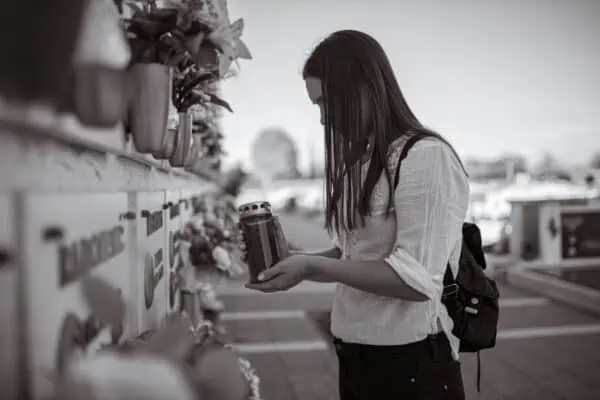At Alabama Funeral Home and Cremation Centers, we understand that you may have a lot of questions regarding the cremation of your loved one. Although we are happy to answer any questions when we meet with you to discuss the details of your loved one’s end of life plans, we know that many of our clients are unable to focus enough to ask questions during this heartbreaking time.
Today, we would like to address some of the questions and concerns people commonly have about cremation and family cremated remains. We will discuss different options of things to do with your loved one’s cremated remains. We will also discuss the practice of scattering, and what the state of Alabama says are the right and wrong places for spreading cremated remains. But most importantly, we will explain why saying a formal goodbye to your loved one matters.
Different Ways To Celebrate the Life of Your Loved One
There are many options for what to do with your family cremated remains. Here are just a few to consider.
Burial
You may consider burying the cremated remains of your loved one in a cemetery. The benefit of burying is that it provides a place where current and future generations can reflect upon the life of the deceased. The burial of cremated remains is also sanctioned by the Catholic Church if done in an appropriate cemetery.
There are costs associated with burial. Besides paying for the plot, some cemeteries require families to pay for an underground vault built to hold the urn. These costs, as well as the cost of a headstone, make burial one of the more expensive options.
Columbarium Niche
A columbarium niche is a small space designed to hold urns for eternity. They may be inside a mausoleum or outdoors along a wall. This method of internment also gives mourners a place to visit. While there are costs associated with this type of burial, they are typically lower than the price of burying cremated remains in a cemetery.
Scattering
Some families choose to scatter the cremated remains of their loved ones at a place special to the individual or family. (Please keep reading to see what the state of Alabama says about scattering.) Although scattering can be a meaningful experience for the deceased’s family and friends, the practice is not sanctioned by the Catholic Church.
If you are bothered by the idea of not having a permanent place to visit after scattering your loved one’s cremated remains, you may want to search your area for a scattering garden. Although relatively new, they provide a place where families can scatter cremated remains as well as place a small marker or headstone to commemorate the individual. Of course, there are costs involved with this option as well.
Keep the cremated remains in an urn at home
Some families choose to keep the cremated remains in an urn that is placed in a special spot in the home. Some family members may feel comfortable knowing that the remains of their loved ones are nearby, although keeping them in a home is not a permanent solution.
Other ideas of things to do with your loved one’s cremains
A quick online search will reveal many options for what to do with the cremated remains of a loved one. You can commission a piece of artwork that is created from the cremated remains. You can place small samples of the cremated remains in receptacles that can be worn as cremation jewelry. You can even have a firework made that includes the cremated remains of your loved one.
What the Law Says About Spreading cremated remains
Cremated remains are sanitary and pose no health threat. Scattering cremated remains on private property is legal, according to Alabama state law.
Although the state of Alabama is relatively silent on providing restrictions for scattering cremated remains, local laws oversee the practice. Be sure to ask officials if you plan to scatter remains at a local, state, or national park or other public lands.
Since Alabama has such a beautiful coastline, many people choose to scatter their loved one’s cremated remains at sea. It is worth noting that federal regulations require that the cremated remains be taken at least three miles from the coastline before being sprinkled overboard.
Why Completing the Ritual Matters
Regardless of whether you bury or scatter the cremated remains or make a firework out of them to be used on the Fourth of July, make sure you formally say goodbye to your family member. It’s an integral part of the grieving process and vital for extended family and friends.





